Self-Care Strategies and Resilience in Stressful Situations
VerifiedAdded on 2023/06/13
|6
|1622
|215
Essay
AI Summary
This essay provides a reflective account of self-care activities employed to manage stressful situations and enhance resilience. It highlights the importance of improving emotional hygiene by addressing emotional pain and pessimistic thoughts, setting aside time for friends, family, and oneself, eating healthy foods, getting enough sleep, maintaining a spiritual habit, and establishing priorities. The essay delves into the specifics of emotional hygiene, emphasizing the need to attend to emotional pain, differentiate between mild and severe emotional injuries, boost self-esteem after rejection, regain feelings amid failure, resolve feelings of guilt, and fill the void after a loss. The conclusion underscores the significance of self-care activities in building resilience and responding to stressful situations with calm strength, ultimately leading to improved well-being. Desklib offers a wealth of similar student-contributed assignments and study resources.
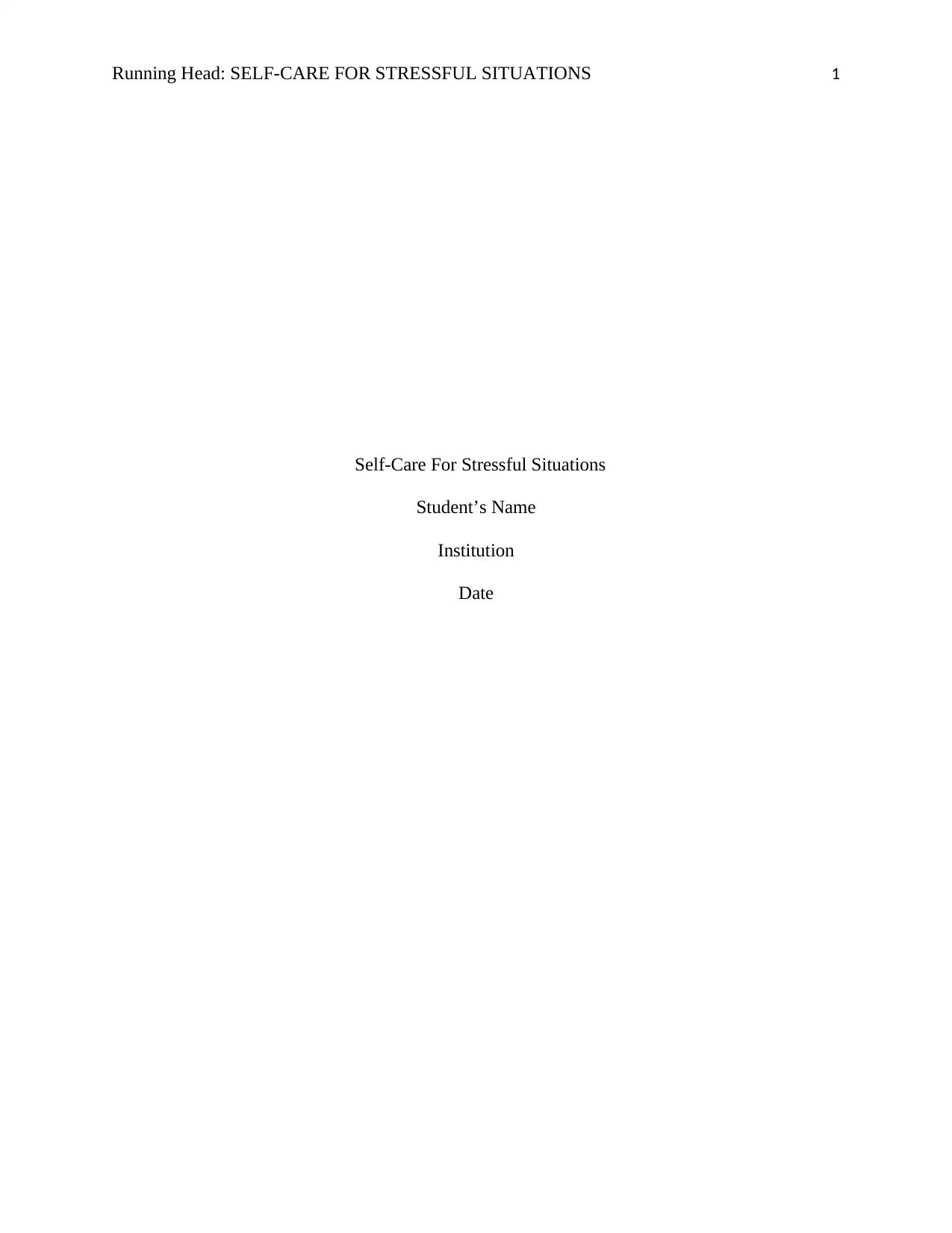
Running Head: SELF-CARE FOR STRESSFUL SITUATIONS 1
Self-Care For Stressful Situations
Student’s Name
Institution
Date
Self-Care For Stressful Situations
Student’s Name
Institution
Date
Paraphrase This Document
Need a fresh take? Get an instant paraphrase of this document with our AI Paraphraser
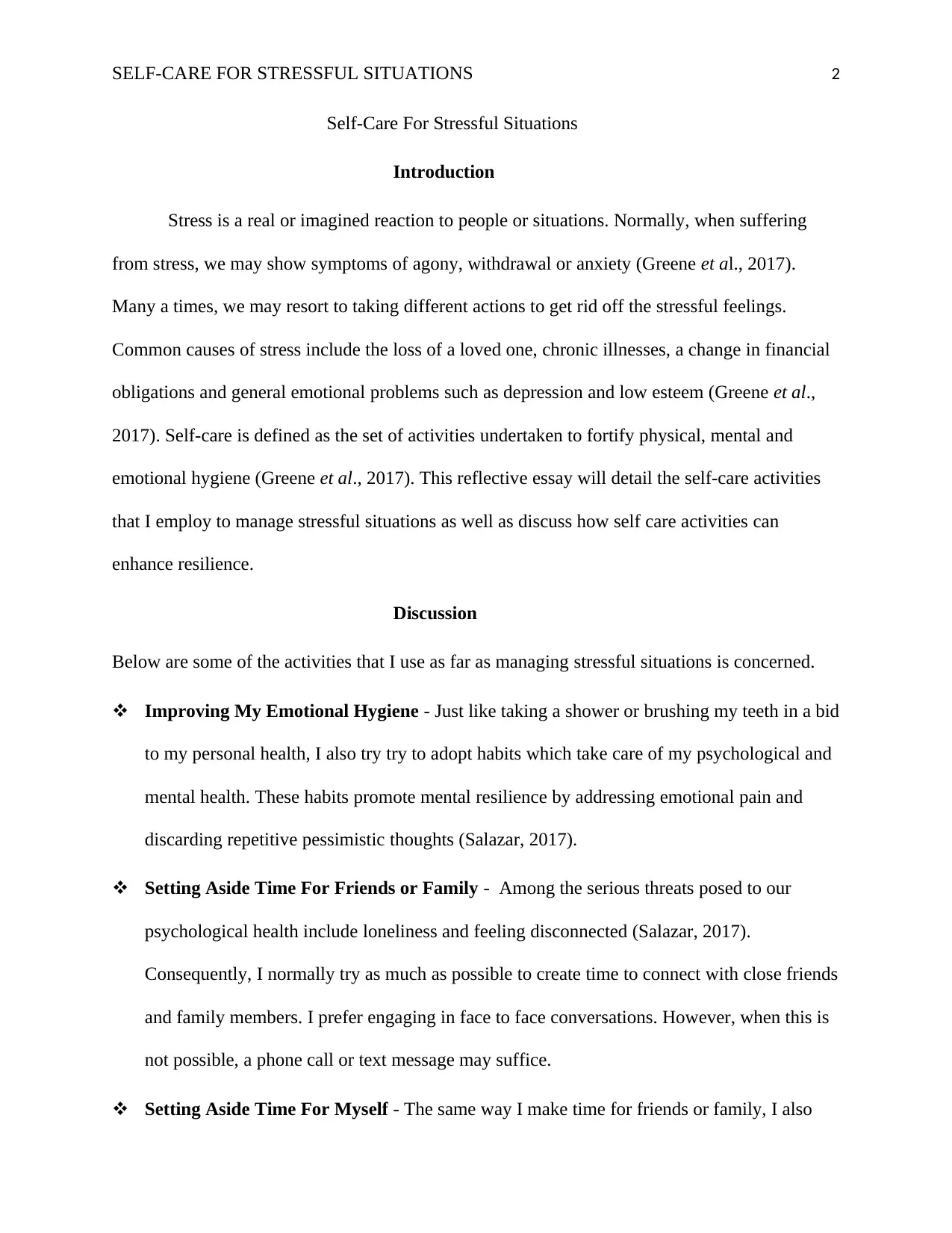
SELF-CARE FOR STRESSFUL SITUATIONS 2
Self-Care For Stressful Situations
Introduction
Stress is a real or imagined reaction to people or situations. Normally, when suffering
from stress, we may show symptoms of agony, withdrawal or anxiety (Greene et al., 2017).
Many a times, we may resort to taking different actions to get rid off the stressful feelings.
Common causes of stress include the loss of a loved one, chronic illnesses, a change in financial
obligations and general emotional problems such as depression and low esteem (Greene et al.,
2017). Self-care is defined as the set of activities undertaken to fortify physical, mental and
emotional hygiene (Greene et al., 2017). This reflective essay will detail the self-care activities
that I employ to manage stressful situations as well as discuss how self care activities can
enhance resilience.
Discussion
Below are some of the activities that I use as far as managing stressful situations is concerned.
Improving My Emotional Hygiene - Just like taking a shower or brushing my teeth in a bid
to my personal health, I also try try to adopt habits which take care of my psychological and
mental health. These habits promote mental resilience by addressing emotional pain and
discarding repetitive pessimistic thoughts (Salazar, 2017).
Setting Aside Time For Friends or Family - Among the serious threats posed to our
psychological health include loneliness and feeling disconnected (Salazar, 2017).
Consequently, I normally try as much as possible to create time to connect with close friends
and family members. I prefer engaging in face to face conversations. However, when this is
not possible, a phone call or text message may suffice.
Setting Aside Time For Myself - The same way I make time for friends or family, I also
Self-Care For Stressful Situations
Introduction
Stress is a real or imagined reaction to people or situations. Normally, when suffering
from stress, we may show symptoms of agony, withdrawal or anxiety (Greene et al., 2017).
Many a times, we may resort to taking different actions to get rid off the stressful feelings.
Common causes of stress include the loss of a loved one, chronic illnesses, a change in financial
obligations and general emotional problems such as depression and low esteem (Greene et al.,
2017). Self-care is defined as the set of activities undertaken to fortify physical, mental and
emotional hygiene (Greene et al., 2017). This reflective essay will detail the self-care activities
that I employ to manage stressful situations as well as discuss how self care activities can
enhance resilience.
Discussion
Below are some of the activities that I use as far as managing stressful situations is concerned.
Improving My Emotional Hygiene - Just like taking a shower or brushing my teeth in a bid
to my personal health, I also try try to adopt habits which take care of my psychological and
mental health. These habits promote mental resilience by addressing emotional pain and
discarding repetitive pessimistic thoughts (Salazar, 2017).
Setting Aside Time For Friends or Family - Among the serious threats posed to our
psychological health include loneliness and feeling disconnected (Salazar, 2017).
Consequently, I normally try as much as possible to create time to connect with close friends
and family members. I prefer engaging in face to face conversations. However, when this is
not possible, a phone call or text message may suffice.
Setting Aside Time For Myself - The same way I make time for friends or family, I also
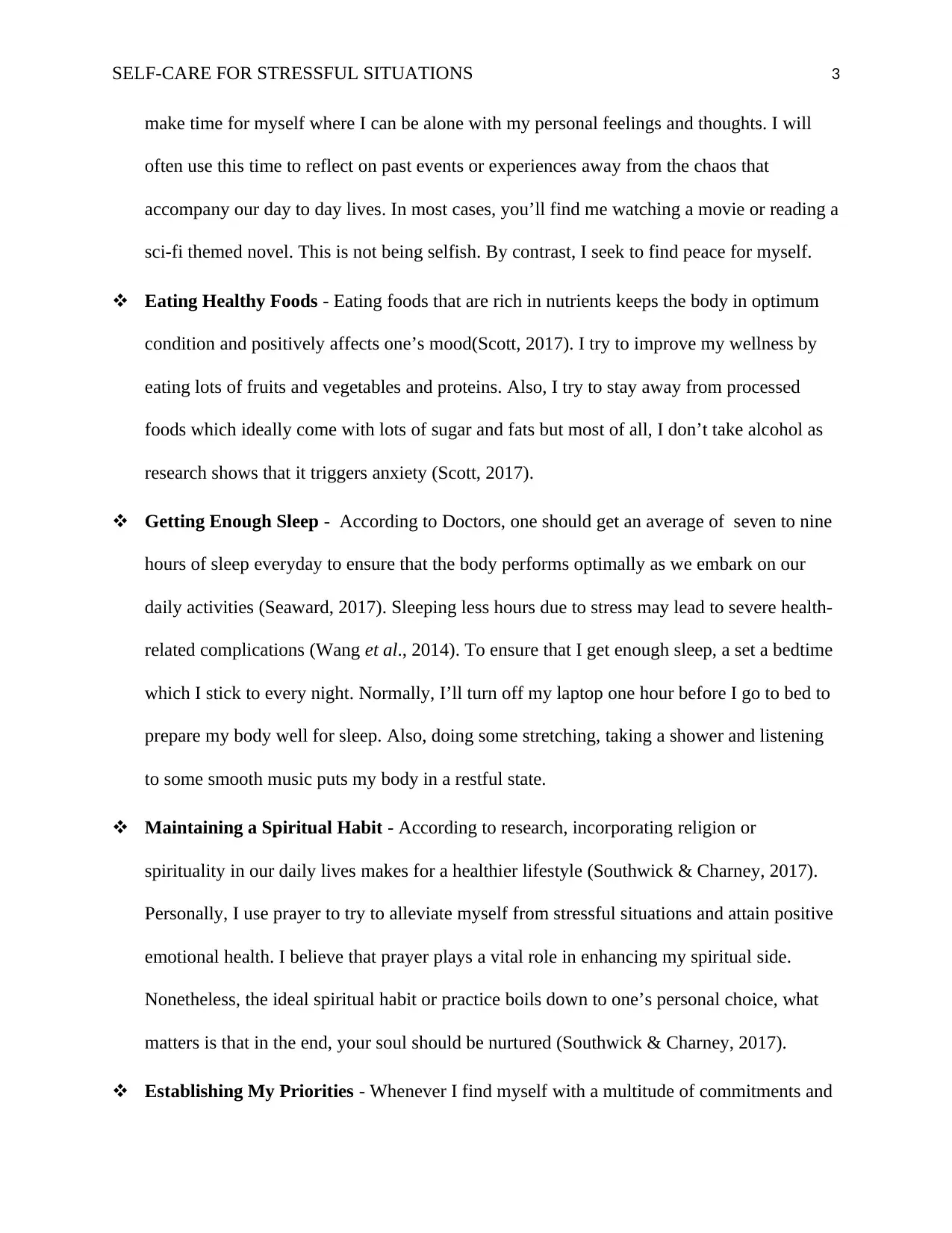
SELF-CARE FOR STRESSFUL SITUATIONS 3
make time for myself where I can be alone with my personal feelings and thoughts. I will
often use this time to reflect on past events or experiences away from the chaos that
accompany our day to day lives. In most cases, you’ll find me watching a movie or reading a
sci-fi themed novel. This is not being selfish. By contrast, I seek to find peace for myself.
Eating Healthy Foods - Eating foods that are rich in nutrients keeps the body in optimum
condition and positively affects one’s mood(Scott, 2017). I try to improve my wellness by
eating lots of fruits and vegetables and proteins. Also, I try to stay away from processed
foods which ideally come with lots of sugar and fats but most of all, I don’t take alcohol as
research shows that it triggers anxiety (Scott, 2017).
Getting Enough Sleep - According to Doctors, one should get an average of seven to nine
hours of sleep everyday to ensure that the body performs optimally as we embark on our
daily activities (Seaward, 2017). Sleeping less hours due to stress may lead to severe health-
related complications (Wang et al., 2014). To ensure that I get enough sleep, a set a bedtime
which I stick to every night. Normally, I’ll turn off my laptop one hour before I go to bed to
prepare my body well for sleep. Also, doing some stretching, taking a shower and listening
to some smooth music puts my body in a restful state.
Maintaining a Spiritual Habit - According to research, incorporating religion or
spirituality in our daily lives makes for a healthier lifestyle (Southwick & Charney, 2017).
Personally, I use prayer to try to alleviate myself from stressful situations and attain positive
emotional health. I believe that prayer plays a vital role in enhancing my spiritual side.
Nonetheless, the ideal spiritual habit or practice boils down to one’s personal choice, what
matters is that in the end, your soul should be nurtured (Southwick & Charney, 2017).
Establishing My Priorities - Whenever I find myself with a multitude of commitments and
make time for myself where I can be alone with my personal feelings and thoughts. I will
often use this time to reflect on past events or experiences away from the chaos that
accompany our day to day lives. In most cases, you’ll find me watching a movie or reading a
sci-fi themed novel. This is not being selfish. By contrast, I seek to find peace for myself.
Eating Healthy Foods - Eating foods that are rich in nutrients keeps the body in optimum
condition and positively affects one’s mood(Scott, 2017). I try to improve my wellness by
eating lots of fruits and vegetables and proteins. Also, I try to stay away from processed
foods which ideally come with lots of sugar and fats but most of all, I don’t take alcohol as
research shows that it triggers anxiety (Scott, 2017).
Getting Enough Sleep - According to Doctors, one should get an average of seven to nine
hours of sleep everyday to ensure that the body performs optimally as we embark on our
daily activities (Seaward, 2017). Sleeping less hours due to stress may lead to severe health-
related complications (Wang et al., 2014). To ensure that I get enough sleep, a set a bedtime
which I stick to every night. Normally, I’ll turn off my laptop one hour before I go to bed to
prepare my body well for sleep. Also, doing some stretching, taking a shower and listening
to some smooth music puts my body in a restful state.
Maintaining a Spiritual Habit - According to research, incorporating religion or
spirituality in our daily lives makes for a healthier lifestyle (Southwick & Charney, 2017).
Personally, I use prayer to try to alleviate myself from stressful situations and attain positive
emotional health. I believe that prayer plays a vital role in enhancing my spiritual side.
Nonetheless, the ideal spiritual habit or practice boils down to one’s personal choice, what
matters is that in the end, your soul should be nurtured (Southwick & Charney, 2017).
Establishing My Priorities - Whenever I find myself with a multitude of commitments and
⊘ This is a preview!⊘
Do you want full access?
Subscribe today to unlock all pages.

Trusted by 1+ million students worldwide
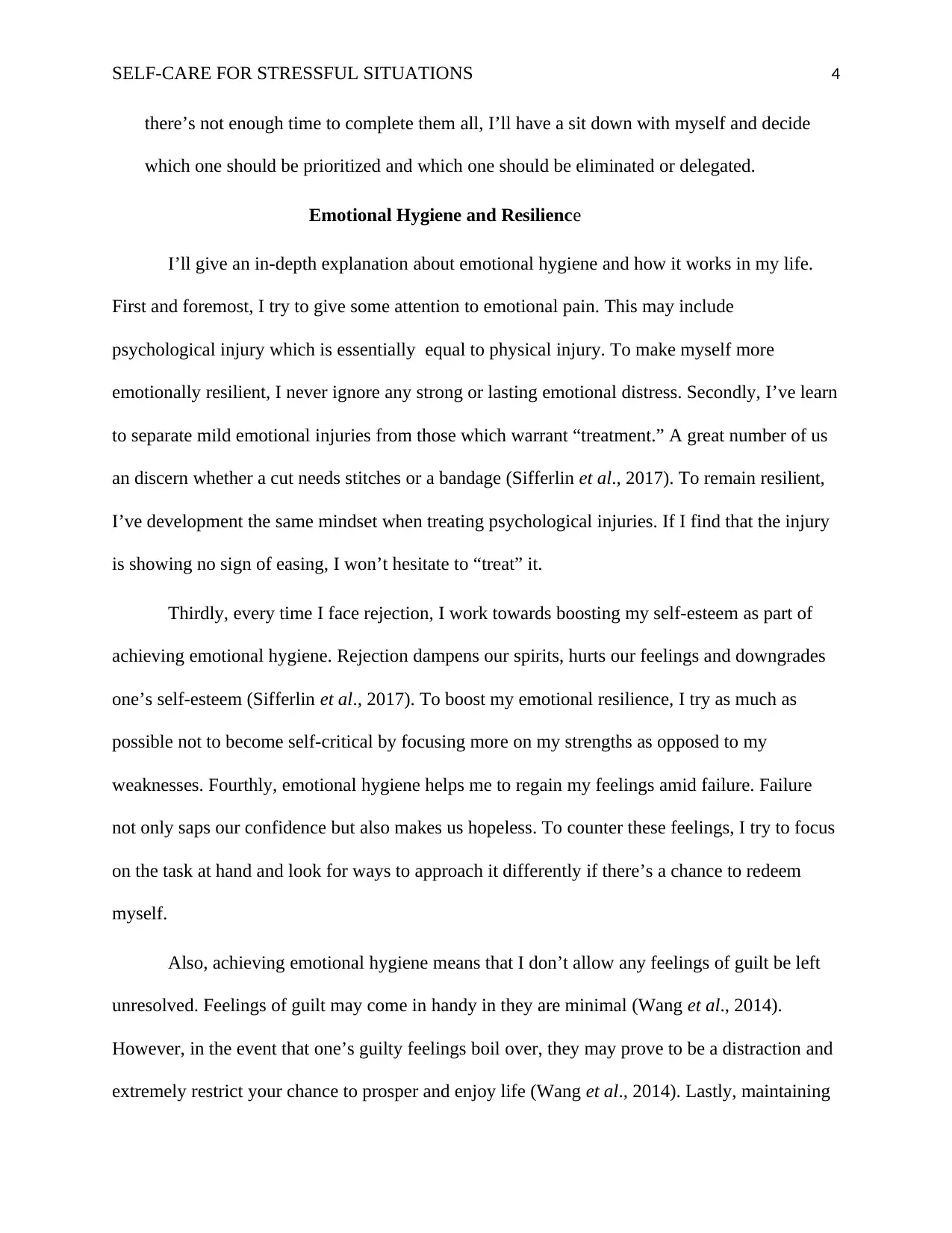
SELF-CARE FOR STRESSFUL SITUATIONS 4
there’s not enough time to complete them all, I’ll have a sit down with myself and decide
which one should be prioritized and which one should be eliminated or delegated.
Emotional Hygiene and Resilience
I’ll give an in-depth explanation about emotional hygiene and how it works in my life.
First and foremost, I try to give some attention to emotional pain. This may include
psychological injury which is essentially equal to physical injury. To make myself more
emotionally resilient, I never ignore any strong or lasting emotional distress. Secondly, I’ve learn
to separate mild emotional injuries from those which warrant “treatment.” A great number of us
an discern whether a cut needs stitches or a bandage (Sifferlin et al., 2017). To remain resilient,
I’ve development the same mindset when treating psychological injuries. If I find that the injury
is showing no sign of easing, I won’t hesitate to “treat” it.
Thirdly, every time I face rejection, I work towards boosting my self-esteem as part of
achieving emotional hygiene. Rejection dampens our spirits, hurts our feelings and downgrades
one’s self-esteem (Sifferlin et al., 2017). To boost my emotional resilience, I try as much as
possible not to become self-critical by focusing more on my strengths as opposed to my
weaknesses. Fourthly, emotional hygiene helps me to regain my feelings amid failure. Failure
not only saps our confidence but also makes us hopeless. To counter these feelings, I try to focus
on the task at hand and look for ways to approach it differently if there’s a chance to redeem
myself.
Also, achieving emotional hygiene means that I don’t allow any feelings of guilt be left
unresolved. Feelings of guilt may come in handy in they are minimal (Wang et al., 2014).
However, in the event that one’s guilty feelings boil over, they may prove to be a distraction and
extremely restrict your chance to prosper and enjoy life (Wang et al., 2014). Lastly, maintaining
there’s not enough time to complete them all, I’ll have a sit down with myself and decide
which one should be prioritized and which one should be eliminated or delegated.
Emotional Hygiene and Resilience
I’ll give an in-depth explanation about emotional hygiene and how it works in my life.
First and foremost, I try to give some attention to emotional pain. This may include
psychological injury which is essentially equal to physical injury. To make myself more
emotionally resilient, I never ignore any strong or lasting emotional distress. Secondly, I’ve learn
to separate mild emotional injuries from those which warrant “treatment.” A great number of us
an discern whether a cut needs stitches or a bandage (Sifferlin et al., 2017). To remain resilient,
I’ve development the same mindset when treating psychological injuries. If I find that the injury
is showing no sign of easing, I won’t hesitate to “treat” it.
Thirdly, every time I face rejection, I work towards boosting my self-esteem as part of
achieving emotional hygiene. Rejection dampens our spirits, hurts our feelings and downgrades
one’s self-esteem (Sifferlin et al., 2017). To boost my emotional resilience, I try as much as
possible not to become self-critical by focusing more on my strengths as opposed to my
weaknesses. Fourthly, emotional hygiene helps me to regain my feelings amid failure. Failure
not only saps our confidence but also makes us hopeless. To counter these feelings, I try to focus
on the task at hand and look for ways to approach it differently if there’s a chance to redeem
myself.
Also, achieving emotional hygiene means that I don’t allow any feelings of guilt be left
unresolved. Feelings of guilt may come in handy in they are minimal (Wang et al., 2014).
However, in the event that one’s guilty feelings boil over, they may prove to be a distraction and
extremely restrict your chance to prosper and enjoy life (Wang et al., 2014). Lastly, maintaining
Paraphrase This Document
Need a fresh take? Get an instant paraphrase of this document with our AI Paraphraser
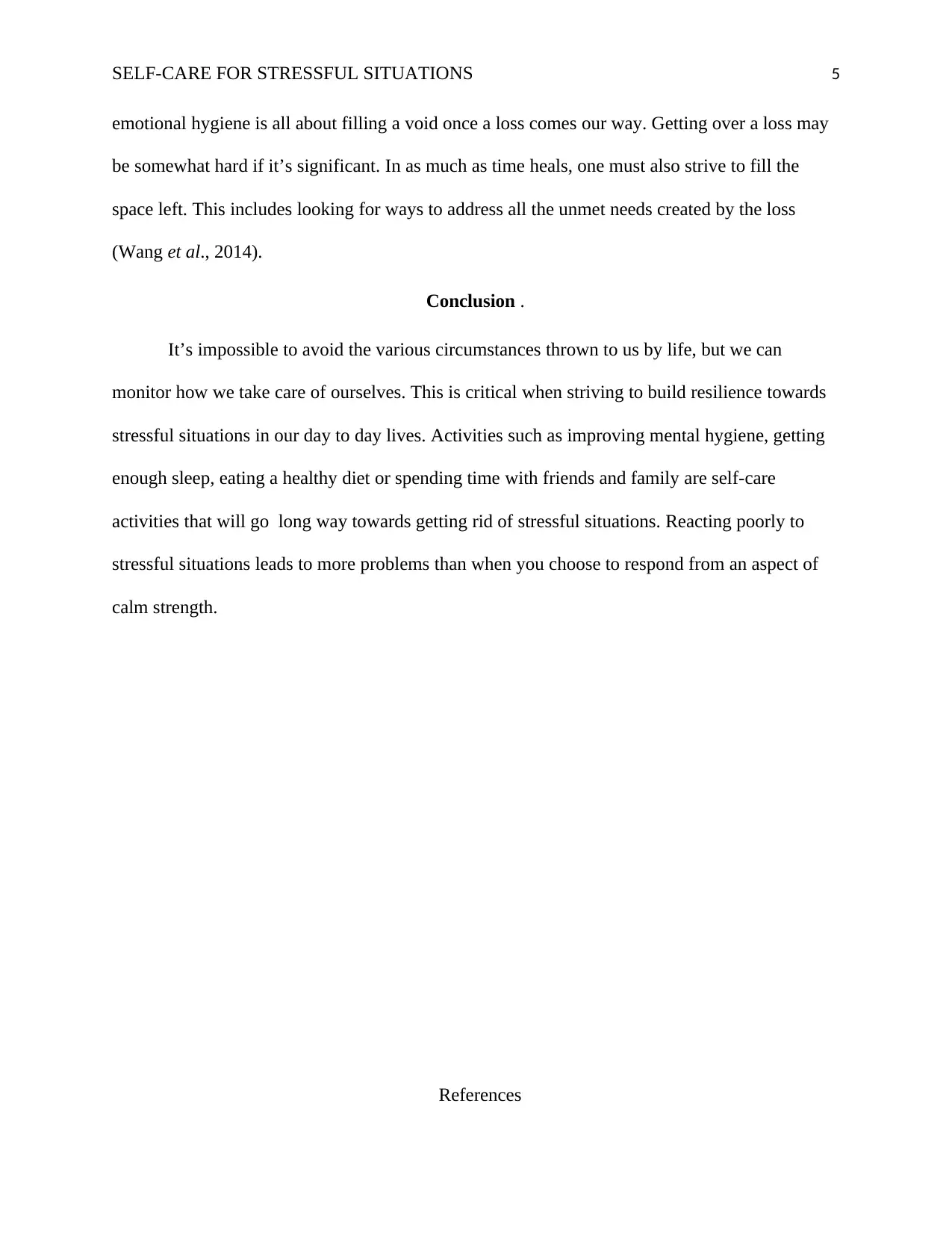
SELF-CARE FOR STRESSFUL SITUATIONS 5
emotional hygiene is all about filling a void once a loss comes our way. Getting over a loss may
be somewhat hard if it’s significant. In as much as time heals, one must also strive to fill the
space left. This includes looking for ways to address all the unmet needs created by the loss
(Wang et al., 2014).
Conclusion .
It’s impossible to avoid the various circumstances thrown to us by life, but we can
monitor how we take care of ourselves. This is critical when striving to build resilience towards
stressful situations in our day to day lives. Activities such as improving mental hygiene, getting
enough sleep, eating a healthy diet or spending time with friends and family are self-care
activities that will go long way towards getting rid of stressful situations. Reacting poorly to
stressful situations leads to more problems than when you choose to respond from an aspect of
calm strength.
References
emotional hygiene is all about filling a void once a loss comes our way. Getting over a loss may
be somewhat hard if it’s significant. In as much as time heals, one must also strive to fill the
space left. This includes looking for ways to address all the unmet needs created by the loss
(Wang et al., 2014).
Conclusion .
It’s impossible to avoid the various circumstances thrown to us by life, but we can
monitor how we take care of ourselves. This is critical when striving to build resilience towards
stressful situations in our day to day lives. Activities such as improving mental hygiene, getting
enough sleep, eating a healthy diet or spending time with friends and family are self-care
activities that will go long way towards getting rid of stressful situations. Reacting poorly to
stressful situations leads to more problems than when you choose to respond from an aspect of
calm strength.
References
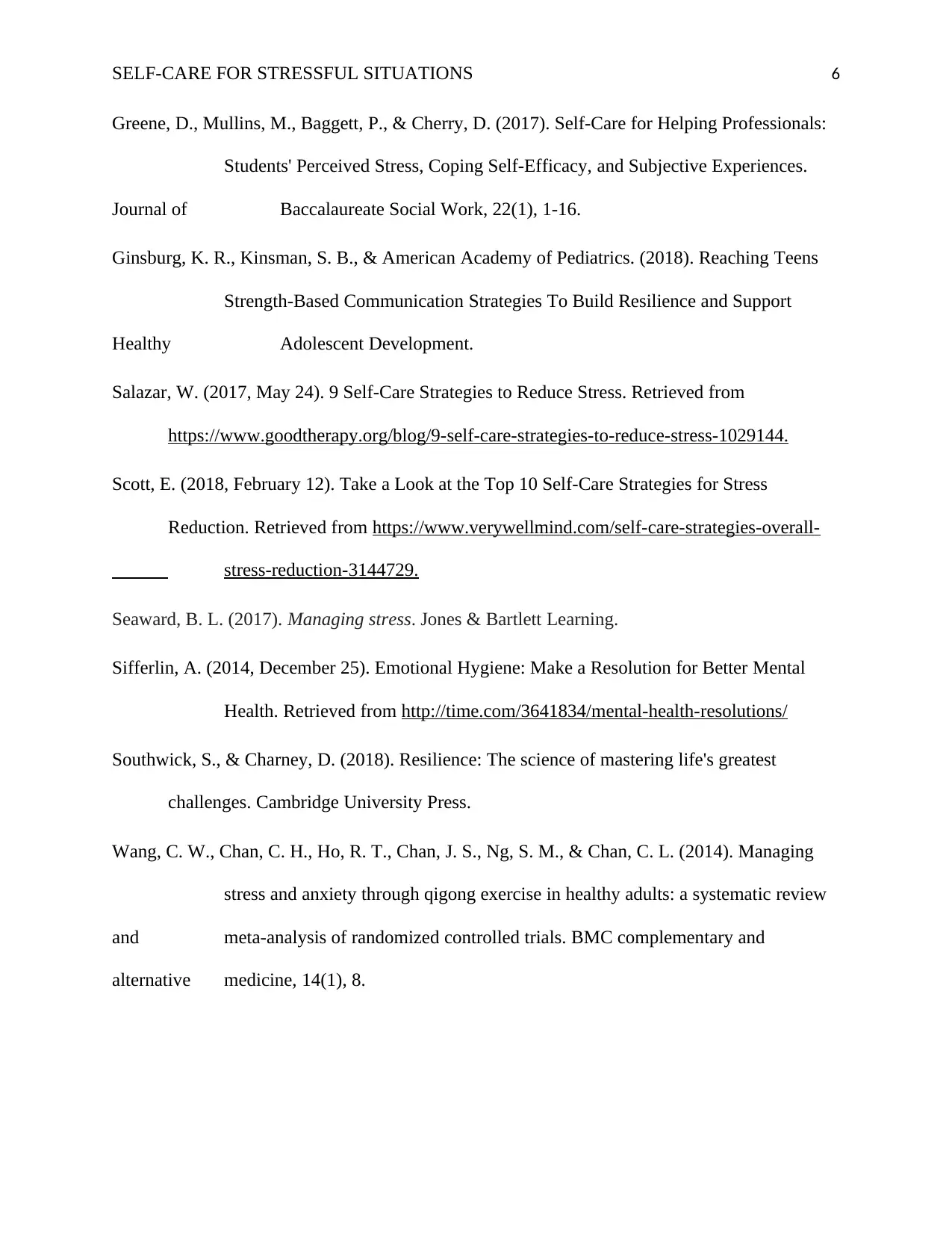
SELF-CARE FOR STRESSFUL SITUATIONS 6
Greene, D., Mullins, M., Baggett, P., & Cherry, D. (2017). Self-Care for Helping Professionals:
Students' Perceived Stress, Coping Self-Efficacy, and Subjective Experiences.
Journal of Baccalaureate Social Work, 22(1), 1-16.
Ginsburg, K. R., Kinsman, S. B., & American Academy of Pediatrics. (2018). Reaching Teens
Strength-Based Communication Strategies To Build Resilience and Support
Healthy Adolescent Development.
Salazar, W. (2017, May 24). 9 Self-Care Strategies to Reduce Stress. Retrieved from
https://www.goodtherapy.org/blog/9-self-care-strategies-to-reduce-stress-1029144.
Scott, E. (2018, February 12). Take a Look at the Top 10 Self-Care Strategies for Stress
Reduction. Retrieved from https://www.verywellmind.com/self-care-strategies-overall-
stress-reduction-3144729.
Seaward, B. L. (2017). Managing stress. Jones & Bartlett Learning.
Sifferlin, A. (2014, December 25). Emotional Hygiene: Make a Resolution for Better Mental
Health. Retrieved from http://time.com/3641834/mental-health-resolutions/
Southwick, S., & Charney, D. (2018). Resilience: The science of mastering life's greatest
challenges. Cambridge University Press.
Wang, C. W., Chan, C. H., Ho, R. T., Chan, J. S., Ng, S. M., & Chan, C. L. (2014). Managing
stress and anxiety through qigong exercise in healthy adults: a systematic review
and meta-analysis of randomized controlled trials. BMC complementary and
alternative medicine, 14(1), 8.
Greene, D., Mullins, M., Baggett, P., & Cherry, D. (2017). Self-Care for Helping Professionals:
Students' Perceived Stress, Coping Self-Efficacy, and Subjective Experiences.
Journal of Baccalaureate Social Work, 22(1), 1-16.
Ginsburg, K. R., Kinsman, S. B., & American Academy of Pediatrics. (2018). Reaching Teens
Strength-Based Communication Strategies To Build Resilience and Support
Healthy Adolescent Development.
Salazar, W. (2017, May 24). 9 Self-Care Strategies to Reduce Stress. Retrieved from
https://www.goodtherapy.org/blog/9-self-care-strategies-to-reduce-stress-1029144.
Scott, E. (2018, February 12). Take a Look at the Top 10 Self-Care Strategies for Stress
Reduction. Retrieved from https://www.verywellmind.com/self-care-strategies-overall-
stress-reduction-3144729.
Seaward, B. L. (2017). Managing stress. Jones & Bartlett Learning.
Sifferlin, A. (2014, December 25). Emotional Hygiene: Make a Resolution for Better Mental
Health. Retrieved from http://time.com/3641834/mental-health-resolutions/
Southwick, S., & Charney, D. (2018). Resilience: The science of mastering life's greatest
challenges. Cambridge University Press.
Wang, C. W., Chan, C. H., Ho, R. T., Chan, J. S., Ng, S. M., & Chan, C. L. (2014). Managing
stress and anxiety through qigong exercise in healthy adults: a systematic review
and meta-analysis of randomized controlled trials. BMC complementary and
alternative medicine, 14(1), 8.
⊘ This is a preview!⊘
Do you want full access?
Subscribe today to unlock all pages.

Trusted by 1+ million students worldwide
1 out of 6
Related Documents
Your All-in-One AI-Powered Toolkit for Academic Success.
+13062052269
info@desklib.com
Available 24*7 on WhatsApp / Email
![[object Object]](/_next/static/media/star-bottom.7253800d.svg)
Unlock your academic potential
Copyright © 2020–2026 A2Z Services. All Rights Reserved. Developed and managed by ZUCOL.





